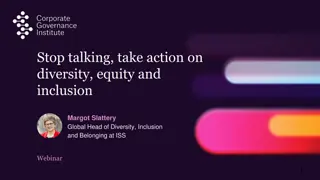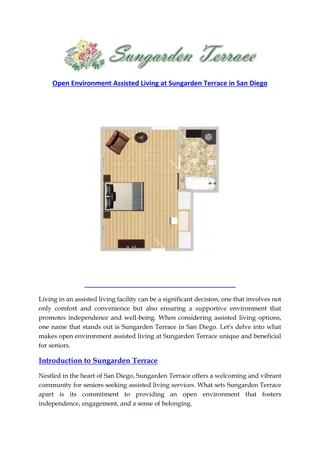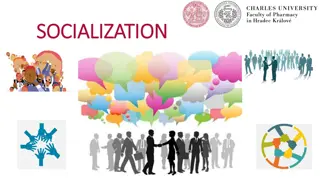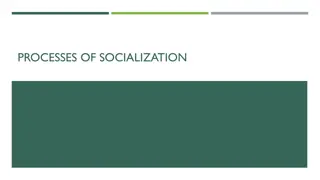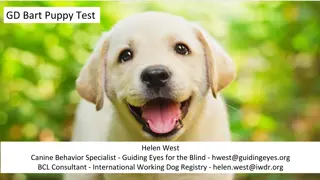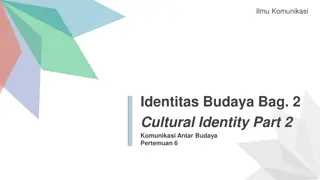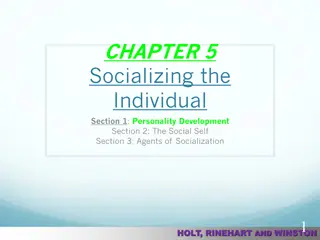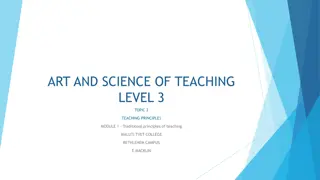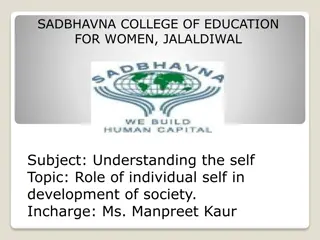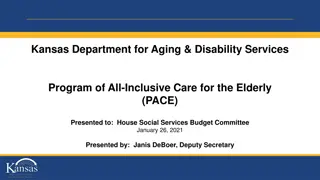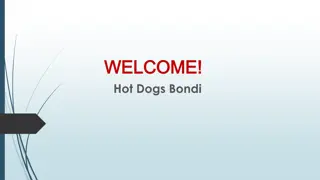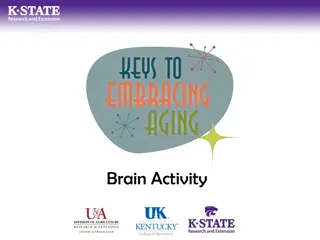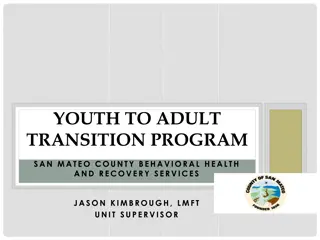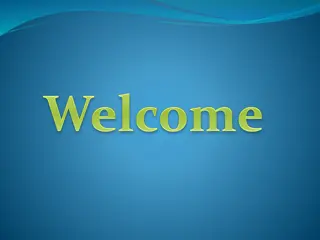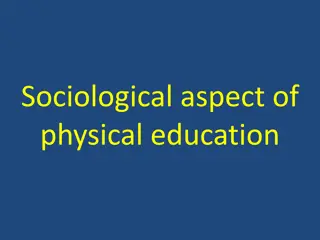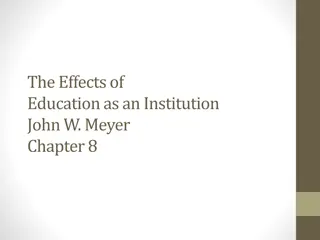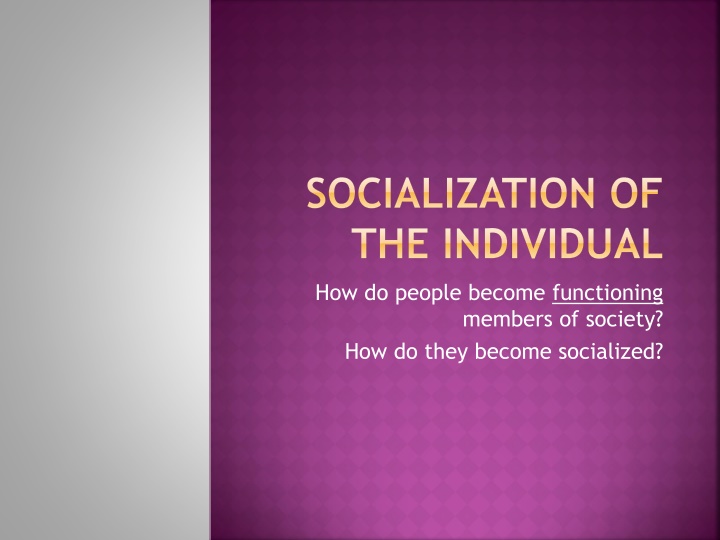
Socialization and Personality Development in Society
Explore the process of socialization and enculturation through which individuals acquire the skills, values, and beliefs of society. Discover how personality development is influenced by culture and interactions with others, shaping one's self-concept and status within the social structure.
Download Presentation

Please find below an Image/Link to download the presentation.
The content on the website is provided AS IS for your information and personal use only. It may not be sold, licensed, or shared on other websites without obtaining consent from the author. If you encounter any issues during the download, it is possible that the publisher has removed the file from their server.
You are allowed to download the files provided on this website for personal or commercial use, subject to the condition that they are used lawfully. All files are the property of their respective owners.
The content on the website is provided AS IS for your information and personal use only. It may not be sold, licensed, or shared on other websites without obtaining consent from the author.
E N D
Presentation Transcript
SOCIALIZATION OF THE INDIVIDUAL How do people become functioning members of society? How do they become socialized?
ENCULTURATION Process of being socialized (acquiring culture) to a particular culture. Much of human personality is the result of our genes (nature), however the socialization process can mold it in particular directions (nurture). Encourage and discourage specific beliefs and attitudes and provide experiences. Socialization: the interactive process by which individuals learn the basic skills, values, beliefs, and behavior patterns of society.
PERSONALITY DEVELOPMENT Personality: the total sum of behaviors, attitudes, beliefs, and values, that are characteristic of an individual. Determines how we adjust to our environment and how we react in specific situations Continue to develop throughout our lifetime. Each culture gives rise to a series of personality traits that are typical of members of that society U.S. competitive, assertive, individualistic How we experience our culture also influences our personality Gender, heritage, region, neighborhood
LOOKING-GLASS SELF Our sense of self is socially created and develops through interaction with others. We imagine how we appear to those around us We interpret their reactions and evaluations Develop a self-concept (feelings and ideas of ourselves) NOT dependent on accurate evaluations, but might become part of our self-concept Development is an ongoing/lifelong process Role of the Other: put ourselves in someone else s shoes in order to understand how someone else feels and thinks to anticipate how that person will act.
LOOKING-GLASS SELF (CONTINUED) On a piece of paper, write YOUR name in the center Leave that sheet of paper at your desk Walk around the room/pass around your sheet and write one word or phrase you would use to describe the name on the paper at each desk. Following this activity, write a half page journal: Is your self-concept accurate or not based on what your classmates said? Will this change the way you live your life or act towards others? If so, how?
STATUS Social Structure: the network of interrelated statuses and roles that guide human interaction Positions (status) that someone occupies, defines who we are and what we are expected to do (guides our behavior - roles) Ascribed Status: based on a person s inherited traits or assigned automatically when a person reaches a certain age. Achieved Status: voluntary positions that are earned, accomplished, or involve at least some effort or activity on the individual s part (or lack of effort). Master Status: status that plays the biggest role in shaping a person s life and ultimately determines their social identity. Changes over the course of one s life Status Inconsistency Status Symbol
ROLES Behaviors, obligations, and privileges attached to a status (expectations or people by society) Each person is expected to successfully fulfill many different roles everyday Role Expectations: the socially determined behaviors expected of a person performing a role. Role Performance: a person s ACTUAL role behavior Often doesn t match perfectly the expectations Often difficult to fulfill the expectations that each of our roles calls for (asked to perform many roles, some of which are contradictory) Reciprocal Roles: corresponding roles that define the patterns of interaction between related statuses
ROLE STRAIN AND ROLE CONFLICT Role Conflict: occurs when fulfilling one status makes it difficult to fulfill the role of another status Role Strain: occurs when a person has difficulty meeting the role expectations of a single status.
WHO ARE YOU? Create a Tagxedo that signifies who you are (www.tagxedo.com): Your statuses (6-8 each) ascribed, achieved Master Status (1) Your roles (2-3 for each status) One Example of Role Strain One Example of Role Conflict Status Symbol (1-2) Use pictures Pictures will have to be added separately since you cannot add them on the website Be prepared to present briefly Print a copy (does not have to in color) and save it to your network space/flash drive to pull up during class.
AGENTS OF SOCIALIZATION People/groups or events/places that influence our orientations to life help create our self-concept, emotions, attitudes, and behavior. Social Institutions: system of statuses, roles, values, and norms that is organized to satisfy one or more of the basic needs of society. Birth Order Personalities are influenced by whether we have brothers, sisters, or neither (step/half) Personalities are also influenced by the order in which we are born into the family (first, middle, last, only when you acquire step siblings) Parents Personality development in children is also influenced by characteristics of the parents Their age, level of education, religious orientation, economic status, cultural heritage, occupation (impact)
FAMILY Lays down our basic sense of self, establishing our initial motivations, values, and beliefs. Subtle Socialization: nonverbal cues, not specific instruction (in all agents of socialization) Social class of a family has a significant impact on us Parents rear their children to have lives like theirs (based on their own life experiences). Many children tend to have the same job as their parents Job Type of a parents plays a key role Blue-collar parents are more apt to stress unlike middle- class parents. Different views of how children develop Working-class parents see children as developing more naturally, while middle-class parents think children need more guidance.
NEIGHBORHOOD/RELIGION Neighborhoods Poor vs. affluent neighborhoods More eyes watching in the affluent neighborhoods Religion strongly influences values and becomes a key component for many people s ideas of right and wrong. Provides answers to perplexing questions (gives experiences meaning symbolic rituals) Emotional Comfort Social Solidarity Guidelines for everyday life Social Control (conflict supports the status quo and helps to maintain social inequalities) Some religions are favored more than others.
DAYCARE/PEER GROUP Daycare one of the first avenues to experience socialization from outside their own home/neighborhood (learn a different culture from others) More daycare = weaker bonds with parents (particularly mom) -> cruel, mean, and fighting. More daycare = higher language and social skills Peer Group over time tends to become the most dominant socialization agent (teaching right/wrong, good/bad, etc. -> subcultures) Early on (elementary), children separate themselves based on gender and develop their own worlds with unique norms.
GROUPS (MORE SPECIFICALLY) Group: set of two or more people who interact on the basis of shared expectations and who posses some degree of common identity. Aggregate: when people gather in the same place at the same time but lack organization or lasting patterns of interaction. Social Category: interaction isn t necessary a means of classifying people according to a shared trait/common status. Easiest to classify groups on the basis of degree of intimacy among its members Primary Group: interact over a relatively long period of time on a direct and personal basis. Secondary Group: interaction is impersonal and temporary in nature. Reference Group: an individual identifies with and whose attitudes and values they often adopt. Perform particular social roles and judge their own behaviors with reference to the standards set by a particular group. In-group vs. Out-group
SCHOOL Transmit knowledge and skills while also earning a broader perspective of the world Rules apply to everyone regardless of parenting types, peer groups, etc. Social Integration: allows all societal members to take advantage of occupational, economic, and political opportunities. Hidden Curriculum: unwritten rules and expectations of behavior, which are not explicitly taught. Occupational Placement: identify talents and abilities and train people to occupy certain positions in society. Negative tracking (different types of education) Corridor Curriculum: what students teach one another (peer group or class pairings) Part of the continuous socialization (things that might not be learned in home-schooling or without an education) Significance of social class
SPORTS AND COMPETITION Teach physical skills and values (team-player and student-athlete) Effects of sports on our self-image: Boys learn that to achieve in sports equates to gaining stature in masculinity Instrumental Relationships Girls are socialized to construct more meaningful relationships.
WORKPLACE Those we work with, teach us a set of skills but also a broader perspective of the world. Anticipatory Socialization: learning to play a role before entering it mental rehearsal for a future activity. Avoid full commitment to an unrewarding career The more one participates in a line of work, the more the work becomes a part of our self- concept. A new/added peer group in our lives
MEDIA Mass media newspapers, magazines, comic books, radio, video games, movies, and especially television present a very different form of socialization than any other, because they offer no opportunity for interaction. Aside from interaction with that medium. Mass media can affect the development of children s self-image, attitudes towards others, and interpersonal behaviors. Doesn t give children social skills or the real-life practice Form connections or disconnections among different groups of people Continuously has us revaluate our idea of normal based on what we see and hear.
SOCIAL NETWORK Web of relationships formed by a sum total of a person s interactions with other people We all belong to more than one group and interact with more than one set of people These various interactions each teach different self- concepts, ideas of right and wrong (socialize us differently) Direct and Indirect relationships (all of which socialize us) Don t always have clear boundaries between various groups but all them provide us with a feeling of community.
NATURE VS. NURTURE Nature centered around heredity (transmission of genetic characteristics from birth parents to children) Instinct: unchanging, biologically inherited behavior pattern Nurture environmental factors and social learning determine our behavior Taught particular ways of thinking and acting most of which is learned from observation and becomes inherent. http://www.youtube.com/watch?v=8AcWo3gbtBk Journal
PERSONALITY CD Through the process of socialization, a person s personality (the complex set of characteristics that distinguish an individual, a nation or group) starts to develop. Many people say that our personality comes from our social environment or contact with others it shapes us, or molds us into who we are over time ( nurture ). Here people might point to specific instances in life that influence a person s character traumatic event, home pressures, etc. Others say that we are born with a distinct personality it is our genes that make us who we are ( nature ). Still, many say it is a combination of nature and nurture. So how has your personality developed to make you who we are today?
PERSONALITY CD CONTINUED Directions: There are so many songs out there that many of us can relate to, and in my mind you can tell a lot about a person based on the music they listen to (often times it tells a story). Think of the music you listen to or have and find the songs that will tell a story about you. Task: Once you have your songs picked out, you will be asked to make a Album Insert of the playlist you created with a description of how that song tells of your personality and how your personality has developed over time. If you want to, you can actually make a CD of your personality! If nothing else, bring your iPod the day this is due in order to share some of your music. Think of events or experiences in your life that have impacted your personality, beliefs, values, etc. If there is only one part of the song that describes you, add that each song doesn t necessarily have to tell about you entirely. Think about the lyrics, the artist, the genre, etc. in how you can use these songs to describe you (some of the songs you pick might be more symbolic in telling about yourself). You must include a minimum of 12 songs in your insert and make it creative MUST BE TYPED IF NOTHING ELSE

